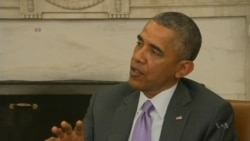WASHINGTON —
The United States is considering a wide range of options to respond to the Islamist extremists who are advancing across Iraq and now control much of the northern part of the country.
With the Islamic State in Iraq and the Levant, or ISIL, vowing to march to Baghdad, Iraq's armed forces have largely melted way in the face of the advance.
The development is seen as an embarrassment for Washington, which has spent an estimated $25 billion on training and equipping the Iraqi military since 2003, when the U.S.-led war there began.
President Barack Obama on Thursday stressed that he is not ruling out any potential response to the crisis.
"I don't rule out anything because we do have a stake in making sure that these jihadists are not getting a permanent foothold in either Iraq or Syria for that matter," Obama said from the White House.
But few if any ideal options exist for the U.S. president, who brought the last U.S. troops home from Iraq just two-and-a-half years ago and is reluctant to involve America in another war abroad.
Drone strikes possible
One option is to use drones to target the ISIL fighters, as the U.S. has done with suspected militants in other insurgency-riddled countries, such as Pakistan, Afghanistan, Yemen and Somalia.
U.S. officials said Thursday that drone strikes are among the options being considered, and point out the U.S. is already flying drones above Iraq for intelligence purposes.
But while drones can be effective in killing individuals, they likely could not stop a force such as ISIL and could endanger civilians, according to Stephen Zunes, a scholar of Middle Eastern politics at the University of San Francisco.
"This is not just a matter of getting a few bad guys and their various hideaways. We're talking about a rebellion that has thousands of armed men that control a very large swath of territory, including some major urban areas," Zunes told VOA.
Ground troops needed?
Many observers say ultimately the battle against ISIL must be won with a ground offensive to retake lost territory. But White House officials have ruled out putting U.S. troops back into Iraq.
In the absence of a U.S. ground offensive, another option is to provide more training, weapons and intelligence to the beleaguered forces of Iraqi Prime Minister Nouri al-Maliki.
However, this carries the risk that advanced U.S. weapons would fall into the hands of ISIL extremists, as they did in Mosul and Tikrit this week. And there are questions about whether Iraqi soldiers are even willing to counter the ISIL assault, added Zunes.
"You can arm and train the local government armed forces all you want, but the question is: are they willing to fight and die for the government? And unfortunately, the Maliki government has alienated so many people in the country that they don't really seem to have the popular support where enough soldiers are willing to risk their lives," he said.
Iraq's Sunni Muslims have long complained that Maliki's Shi'ite-dominated government has worsened sectarian tensions by not sharing power and by cracking down on Sunni-led protests demanding reforms.
Iraq army the 'first line of defense'
Nonetheless, the Iraqi army remains the best option for combating the Sunni ISIL, said Andreas Krieg, an expert on transnational groups in the Middle East and a lecturer at King's College London.
"The Iraqi military has, despite all the billions we invested in security sector reform, not really performed in the way we want it to perform. But the Iraqis will obviously be the first line of defense against [ISIL], so they will need to be propped up in one way or another," Krieg told VOA.
Krieg said private security companies could play a role in helping train the Iraqi military. He said Western intelligence services should also focus on identifying and supporting ostensibly moderate Sunni fighters both in Iraq and in Syria, where ISIL also controls territory.
As the U.S. mulls its options, ISIL leaders are threatening to advance on the capital, Baghdad. Though few analysts think the rebels can take the heavily fortified city, Krieg said it is crucial the group be stopped before it can succeed in its goal of establishing an Islamic state.
"It is quite fragile at the moment. They don't have the fighting force to actually administer the vast territory that they have gained. So I think because they are weak right now, if we act quickly, I think something can be done. But once they consolidate their power over months to come, I think we will face a much bigger problem that we will not be able to contain," he said.
While ISIL is for now focused on securing and holding territory, Krieg and other analysts warn that the emergence of a radical jihadist state in the heart of the Arab world could eventually threaten U.S. allies in the Middle East and Europe.
It also means millions of Iraqis and Syrians would be forced to adhere to a strict version of Islamic law, which ISIL said on Thursday includes mandatory mosque attendance, modesty codes for women, and the amputation of hands for thieves.
Related video by VOA's Meredith Buel:
With the Islamic State in Iraq and the Levant, or ISIL, vowing to march to Baghdad, Iraq's armed forces have largely melted way in the face of the advance.
The development is seen as an embarrassment for Washington, which has spent an estimated $25 billion on training and equipping the Iraqi military since 2003, when the U.S.-led war there began.
President Barack Obama on Thursday stressed that he is not ruling out any potential response to the crisis.
"I don't rule out anything because we do have a stake in making sure that these jihadists are not getting a permanent foothold in either Iraq or Syria for that matter," Obama said from the White House.
But few if any ideal options exist for the U.S. president, who brought the last U.S. troops home from Iraq just two-and-a-half years ago and is reluctant to involve America in another war abroad.
Drone strikes possible
One option is to use drones to target the ISIL fighters, as the U.S. has done with suspected militants in other insurgency-riddled countries, such as Pakistan, Afghanistan, Yemen and Somalia.
U.S. officials said Thursday that drone strikes are among the options being considered, and point out the U.S. is already flying drones above Iraq for intelligence purposes.
But while drones can be effective in killing individuals, they likely could not stop a force such as ISIL and could endanger civilians, according to Stephen Zunes, a scholar of Middle Eastern politics at the University of San Francisco.
"This is not just a matter of getting a few bad guys and their various hideaways. We're talking about a rebellion that has thousands of armed men that control a very large swath of territory, including some major urban areas," Zunes told VOA.
Ground troops needed?
Many observers say ultimately the battle against ISIL must be won with a ground offensive to retake lost territory. But White House officials have ruled out putting U.S. troops back into Iraq.
In the absence of a U.S. ground offensive, another option is to provide more training, weapons and intelligence to the beleaguered forces of Iraqi Prime Minister Nouri al-Maliki.
However, this carries the risk that advanced U.S. weapons would fall into the hands of ISIL extremists, as they did in Mosul and Tikrit this week. And there are questions about whether Iraqi soldiers are even willing to counter the ISIL assault, added Zunes.
"You can arm and train the local government armed forces all you want, but the question is: are they willing to fight and die for the government? And unfortunately, the Maliki government has alienated so many people in the country that they don't really seem to have the popular support where enough soldiers are willing to risk their lives," he said.
Iraq's Sunni Muslims have long complained that Maliki's Shi'ite-dominated government has worsened sectarian tensions by not sharing power and by cracking down on Sunni-led protests demanding reforms.
Iraq army the 'first line of defense'
Nonetheless, the Iraqi army remains the best option for combating the Sunni ISIL, said Andreas Krieg, an expert on transnational groups in the Middle East and a lecturer at King's College London.
"The Iraqi military has, despite all the billions we invested in security sector reform, not really performed in the way we want it to perform. But the Iraqis will obviously be the first line of defense against [ISIL], so they will need to be propped up in one way or another," Krieg told VOA.
Krieg said private security companies could play a role in helping train the Iraqi military. He said Western intelligence services should also focus on identifying and supporting ostensibly moderate Sunni fighters both in Iraq and in Syria, where ISIL also controls territory.
As the U.S. mulls its options, ISIL leaders are threatening to advance on the capital, Baghdad. Though few analysts think the rebels can take the heavily fortified city, Krieg said it is crucial the group be stopped before it can succeed in its goal of establishing an Islamic state.
"It is quite fragile at the moment. They don't have the fighting force to actually administer the vast territory that they have gained. So I think because they are weak right now, if we act quickly, I think something can be done. But once they consolidate their power over months to come, I think we will face a much bigger problem that we will not be able to contain," he said.
While ISIL is for now focused on securing and holding territory, Krieg and other analysts warn that the emergence of a radical jihadist state in the heart of the Arab world could eventually threaten U.S. allies in the Middle East and Europe.
It also means millions of Iraqis and Syrians would be forced to adhere to a strict version of Islamic law, which ISIL said on Thursday includes mandatory mosque attendance, modesty codes for women, and the amputation of hands for thieves.
Related video by VOA's Meredith Buel:












